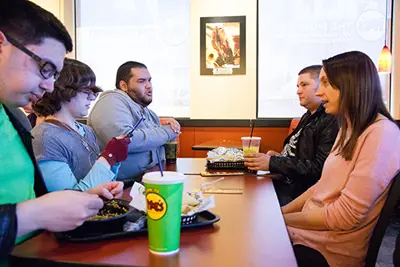Hands-on Training and Research Prepared Her for the Role
 Image by Meghan Moore
Image by Meghan Moore
02/08/2017
By Katharine Webster
Last fall, Devon White ’15 ’16 was living in the trendy Davis Square neighborhood of Somerville. She had just graduated with her master’s in autism studies at UMass Lowell and had a job she loved, working with children on the autism spectrum.
But she still felt restless. So when she ran across a LinkedIn job posting for a Board Certified Behavior Analyst (BCBA) to help run a brand-new autism treatment center in Kuwait, she applied — even though she was still waiting for the results of her BCBA exam.
“I always thought that if I could find a way to travel and help people, that would be my dream,” she says.
Now her dream has come true. In January she began work as the programs director and lead BCBA at Malak Special Needs Services, a startup that just opened its doors to a small number of children.
But when they returned to Kuwait, their son regressed. So Alebrahim decided to open a state-of-the-art treatment center in Kuwait City with BCBAs, speech therapists and occupational therapists under one roof. White says the Malak center is the first affordable, comprehensive treatment center in Kuwait.
“Now the center is a dream place. If you could choose one facility to work with kids, this would be it,” White says. “They have all the materials they need. They just need somebody to put everything into action.”
That would be White, who accepted the job as programs director after visiting Kuwait in early December. She arrived at night and checked into a lavish hotel suite filled with fruit baskets and welcome cards. But when the call to prayer woke her at 4 a.m. and she opened her curtains, she was confronted by a landscape of scattered skyscrapers and desert.
“Everything was brown and dust-colored, and I thought, ‘Maybe this is a huge mistake!’” she admits. “But six hours later, I was at the center, and I was so happy and energized by all the people who wanted to learn and wanted to work, and by the amount of need. And it felt like a little family.”
 Image by Courtesy photo
Image by Courtesy photo
“There’s a huge discrepancy in money and resources, and that’s even more true in a country like Kuwait where health insurance doesn’t cover autism treatment,” she says.
White says she never would have had the confidence to take the job in Kuwait without the research experience and rigorous training she got here, including studying 3-year-olds with Assoc. Prof. Richard Serna. The study took place at a Head Start program in Lowell, where many of their research subjects were non-native English speakers and immigrants.
“When you’re in this inner-city environment or in a different country, there are so many cultural sensitivities you need to attend to,” she says. “It matters because you need to make relationships with parents and families, too, for this work to be meaningful.”
White also did research as an undergraduate and graduate student with Assoc. Profs. Doreen Arcus and Ashleigh Hillier. With Arcus, she designed an ongoing study, based on her own family experience, to determine whether children with ASD develop better social skills if they have a neurotypical sibling. With Hillier, she published a paper on college students’ attitudes toward fellow students with ASD. She hopes eventually to do original research in Kuwait.
“I’m so lucky to have so many amazing mentors,” she says. “In terms of my confidence and knowing my own competency, the research experiences were huge. And I would never be able to make this move across the world if I weren’t a confident researcher and clinician now.”




